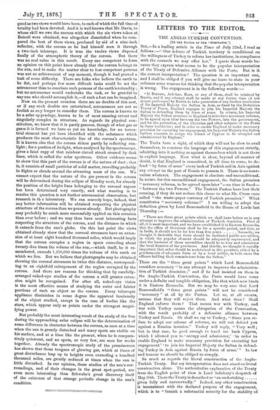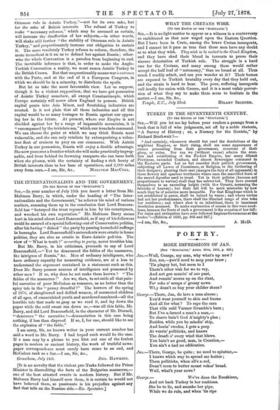LETTERS TO THE EDITOR.
THE ANGLO-TURKISH CONVENTION.
[TO THE Enrrort OP THE "SPECTATOR."] SIR,—In a leading article in the Times of July 22nd, I read as follows :—" Our defence of Turkish territory is conditional on the willingness of Turkey to reform her institutions, in compliance with the counsels we may offer her." I quote these words be- cause they express what seems to be the popular interpretation of the Treaty of Defensive Alliance with the Porte. But is it the correct interpretation ? The question is an important one, and I shall be obliged if you will give me leave to state in your columns some reasons for thinking that the popular interpretation is wrong. The engagement is in the following words :- "If Batoura, Ardahan, Rare, or any of them, shall be retained by Russia, and if any attempt shall be made at any future time (zi 14716 ipoque quelconque) by Russia to take possession of any further territories of his Imperial Majesty the Sultan in Asia, as fixed by the Definitive Treaty of Peace, England engages to join his Imperial Majesty the Sultan in defending them by force of arms. In return, his Imperial Majesty the Sultan promises to England to introduce necessary reforms, to be agreed upon later between the two Powers, into tho government, and for the protection, of the Christian and other subjects of the Porto in these territories; and in order to enable England to make necessary provision for executing her engagement, his Imperial Majesty the Sultan further consents to essign the Island of Cyprus to be occupied and administered by England."
The Turks have a right, of which they will not be slow to avail
themselves, to construe the language of this engagement strictly, admitting into it nothing as against themselves which is not there in explicit language. Now what is clear, beyond all manner of doubt, is that England is committed, in all time to come, to de- fend "by force of arms" every inch of Turkish soil in Asia against any attempt on the part of Russia to possess it. There is no reser- vation whatever. The engagement is absolute and unconditional.
In return for this unconditional engagement, the Sultan promises "necessary reforms, to be agreed upon later "—no time is flied— "between the two Powers." The Turkish Pashas have lost their cunning, if they do not reduce this clause to what Mr. Cross once called "the waste-paper currency of Turkish promises." What constitutes "necessary reforms?" I am willing to adopt the definition given by Lord Beaconsfield in the Rouse of Lords last Thursday :—
" There are three great points which we shall have before us in any attempt to improve the administration of Turkish dominion. First of all, it is most important, and we have established it in Eastern Rotnnelia, that the office of Governor shall be for a specific period, and that, as in India, it should not be for less than five years Secondly, we thought it desirable that there should be instituted public assemblies, in which the popular element should be adequately represented, and that the business of those assemblies should be to levy and administer the local finances of the provinces. And thirdly, we thought it equally important that order should be maintained in this province, either by a gendarmerie of adequate force or by a local militia, in both cases the officers holding their commissions from the Sultan."
These are the "three great points" which Lord Beaconsfield considers necessary "in any attempt to improve the administra- tion of Turkish dominion ;" and if he had insisted on them in the Anglo-Turkish Convention, the Porte would have come under a definite and tangible obligation, like that which now binds it in Eastern Roumelia. But we may be very sure that Lord Beaconsfield's "three great points" will not be considered " necessary " at all by the Pashas. Let us, at all events, assume that they will reject them. And what then ? Shall England enforce them? That means war with Turkey, and war with Turkey means the abrogation of the Convention, with the result probably of a defensive alliance between Turkey and Russia. Or shall we say to Turkey, "Since you re- fuse to adopt our scheme of reforms, we will not defend you against a Russian invasion." Turkey will reply, "Very well ; but in that case, be good enough to hand inc back Cyprus, which I allowed you to occupy and administer," in order to enable England to make necessary provision for executing her engagement " to join his Imperial Alajesty the Sultan in defend- ing Turkey in Asia against Russia by force of arms.'" In law and honour we should be obliged to comply.
So much as regards the literal construction of the Anglo- Turkish Treaty. But my interpretation does not stand on literal construction alone. The authoritative explanation of the Treaty from the English point of view is Lord Salisbury's despatch of May 30th. There the Treaty is described as "an undertaking given fully and unreservedly." Indeed, any other construction is inconsistent with the declared purpose of the engagement, which is to "furnish a substantial security for the stability of
Ottoman rule in Asiatic Turkey,"—not for its own sake, but for the sake of British interests. The refusal of Turkey to make "necessary reforms," which may be assumed as certain, will increase the disaffection of her subjecta,—in other words, will shake stlll further "the stability of Ottoman rule in Asiatic Turkey," and proportionately increase our obligation to sustain it. The more resolutely Turkey refuses to reform, therefore, the more incumbent is it on us to defend her against Russia ; other- wise the whole Convention is a paradox from beginning to end. The inevitable inference is that, in order to make the Anglo- Turkish Convention a reality, we must annex Asiatic Turkey to the British Crown. But that unquestionably means war a outrance with the Porte, and at the end of it a European Congress, in which we should be in a minority, to distribute the spoils.
But let us take the most favourable view. Let us suppose, though it be a violent supposition, that we have got possession of Asiatic Turkey somehow, all except Constantinople, which Europe certainly will never allow England to possess. British capital pours into Asia Minor, and flourishing industries are created. Is it not plain that all these industries and all this capital would be so many hostages to Russia against our oppos- ing her in the future. At present, where our Empire is not shielded against her by a range of impassable mountains, it is "encompassed by the inviolate sea," which our ironclads command. We can choose the point at which we may think Russia most vulnerable, and she can only retaliate by extemporising a volun- teer fleet of cruisers to prey on our commerce. With Asiatic Turkey in our possession, Russia will enjoy a double advantage. She now possesses a frontier which she will make practically impreg- nable, and from behind its frowning ramparts she can issue forth when she pleases, with the certainty of finding a rich booty of British interests close to her base of operations, and 2,000 miles



































 Previous page
Previous page